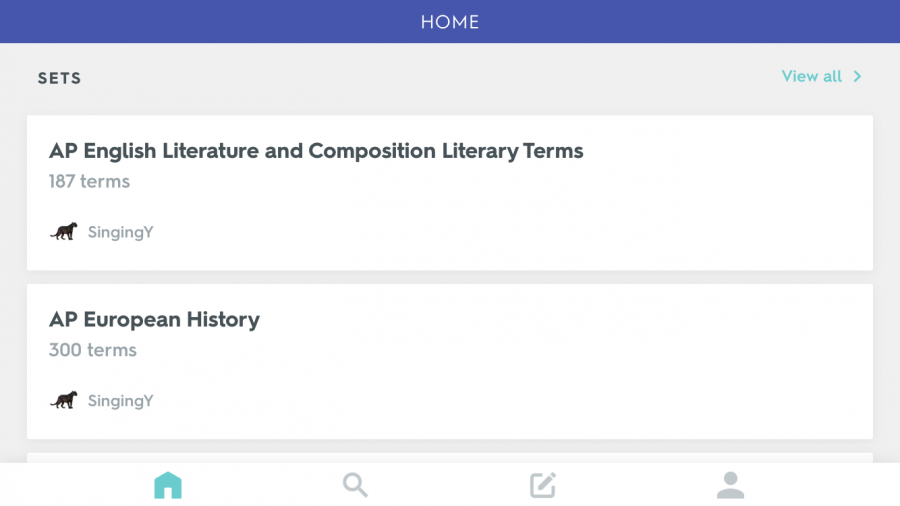Study Tips for Testing Season (Part 2)
Photo by Yetunde Olagbegi
Pictured here is my Quizlet home page, excusing the username because I cannot change it. I have made decks of flashcards for two of my AP classes in preparation for the upcoming exams.
Testing season is just around the corner. The time in which students are assessed on an entire year’s worth of material which may seem daunting and is. We can be tested on anything, even topics we learned as early as September which means forming an extensive, yet doable studying plan can work wonders in our favor. Everyone has their own ways of doing this whether it be hiring a tutor, or making thousands of flashcards, etc. But if you find yourself stuck on what path to approach or want a refresher on some helpful studying tips for final exams, then keep on reading. A few months ago, I wrote a three-part guide including some general tips on focus strategies, time management, and studying that you might find helpful in addition to this article. You can find part one of the three-part series, here. Without further ado, here is everything you need to know to be prepared for the upcoming testing season:
- Make study guides.
Because final exams cover a wide range of topics and subjects, some may find it helpful to compile all the material into one document. This will allow you to avoid flipping through various packets, worksheets, and other materials that your teachers have given you. You can make a study guide in many different ways, just choose the way that is most convenient for you. I know people who type the entire study guide using their classroom notes and their textbooks, some gather helpful review sheets from different websites and resources and consolidate the information into one document, etc. You can even make this a group effort. Contact some of your friends and see if they would be interested in splitting the workload with you. You can make a document and share it with them, that way all of you can add items to it and improve it. Even better, now all of you have a study guide to prepare you for the final exam, and you saved time by dividing up the task. Make sure to format your study guide so that it suits your style of learning. For example, if you are more of a visual learner, spice your study guide up by adding visual effects, like pictures and diagrams, and by color-coding different sections.
2. Switch it up.
If you find a particular studying method is not helping you, change it up! Don’t be afraid to deviate from using a specific method just because you think it works for everyone else. Different methods will work for some people, and not for others, you just have to find the right one. If you’ve tried flashcards and find them annoying and stressful, then put them aside and try something else, like reading the material out loud to yourself to get your brain to process the information better. Some find it easier to learn through sound rather than visually. Also, don’t be afraid to change your studying habits for different subjects as you see fit. Maybe study guides help you more with history, but not so much with math, just find what it is that helps you. You may also find it helpful to revolve your focus. Switching up the subjects you are studying can lessen the strain on your brain and significantly prevents burnout since you won’t be stuck on one topic/subject for a long period of time. This strategy can help you focus more and stay engaged while studying.
3. Focus on your weaknesses.
You should not dedicate the same amount of time of studying to every single topic/subject. Instead, focus more time into the areas you find yourself unsure or unconfident in, rather than the topics you can ace and problems you can practically solve with your eyes closed. Final exams incorporate material from all the units you learn in class, not just a few select ones. That’s why you must make sure you are at least familiar with all the possible questions that can be asked of you. If you find that you have been doing great in algebra all year long, yet find that you have barely been passing chemistry, then make sure you dedicate more time to reviewing chemistry topics rather than reviewing math topics you can recite by heart. Start preparing earlier to study for subjects that you know you need the most help with, make sure to ask a teacher if you don’t know where to start. If you are not improving, and going to a teacher hasn’t helped, consider hiring a tutor. There is no shame in seeking additional help!
4. Budget your time.
One of the reasons studying for finals is so hard is because you have to find time in between finishing your upcoming assignments and your homework, plus completing whatever activities you’ve got going on during the week, and somehow manage to find a way to squeeze in time for studying, if you aren’t exhausted already by the end of it. This is where time management can be a great help. Organizing your schedule and assigning strict timeslots to all your tasks, is a sure-fire way to find enough time to study. This is not always easy, especially if you are weighed down by more responsibilities than others, but even a few minutes of each day is enough to get you prepared for testing day. Whether it be half an hour during your study hall, or a few minutes before you go to bed, any time you can spare will only help you out in the long run. Try to avoid distractions that will only waste time and consider studying on weekends if you find that your schedule is lighter on those days. Just remember—The more time you study, the better your outcomes will be during testing season.
5. Do practice problems/exams.
I’m sure you’ve heard the phrases, “Practice makes perfect!” and “Practice is the key to success” and they are both true. You can only memorize and study so much material, but practice tests/questions assess how well you understand what you’ve learned. In the same way that athletes run to train for a marathon, practice exams allow us to “train” for the real tests, by giving us glimpses of what we may encounter on test day. Practice exams are also a great way to combat any anxiety you may be experiencing in anticipation of the upcoming exams. Taking an exam similar to the one you will take in the future can help reassure you, while also enlightening you on skills and questions you need to work on in preparation for the real thing. There are many ways to go about doing this. If you are taking an AP exam you can search for previous exams that were given out in the past. Unfortunately, you won’t find any multiple-choice questions, but you will find free-response questions from previous AP exams. Another strategy is purchasing a review book and doing the problems in the book. You can also just search for some on the internet, that’s the wonderful thing about technology, you can usually find whatever you want with a simple Google search. Don’t be afraid to also reach out to your teachers for review questions or for answers to the review questions you find online as well.






